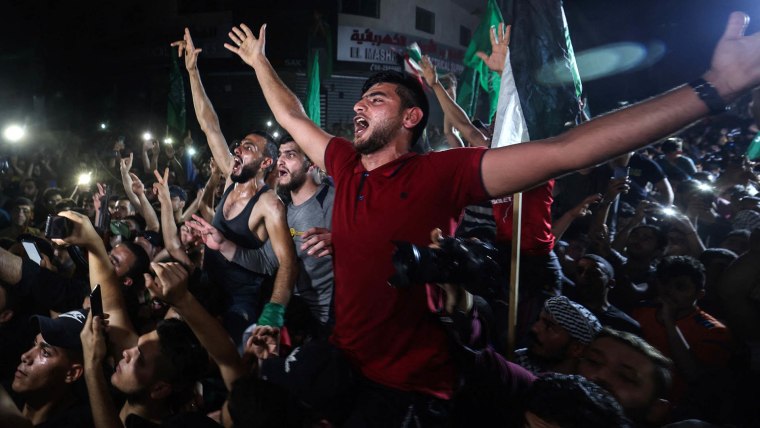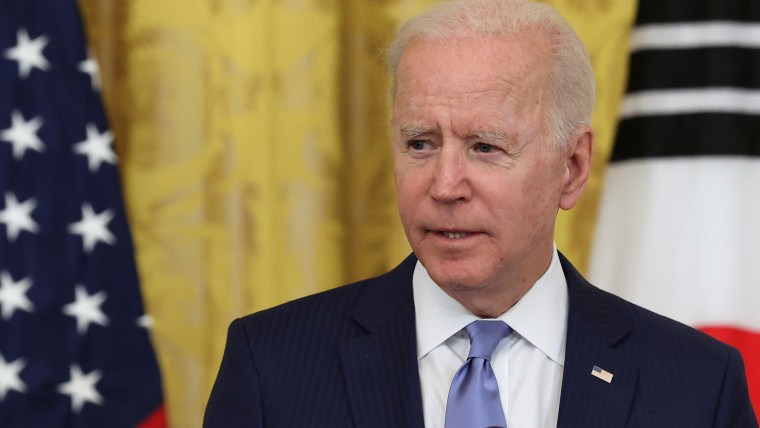Missiles traded by Israel and Palestinian militants. Death and destruction in the long impoverished Gaza Strip. Terror on Israeli streets as rockets light up the night sky. And an eventual cease-fire that calms the violence — until it flares up again next time.
It's a grim, familiar cycle that has haunted the Middle East for decades and bedevilled successive American administrations. But this time, President Joe Biden said that he believes there is "a genuine opportunity to make progress" toward Israelis and Palestinians living in peace.
It's a big pitch that would require making headway on a seemingly intractable problem with ancient roots and a litany of contemporary complications.
"We have been in this situation before: It's like 'Groundhog Day,'" said Yossi Mekelberg, a senior consulting research fellow at Chatham House, a think tank in London.
Some experts see glimmers of hope this time, however.
Biden and his team are viewed by many internationally as more competent and even-handed than their predecessors in the Trump administration, which broke with decades of U.S. foreign policy by recognizing Jerusalem as Israel's capital and condoning Jewish settlements in the West Bank.
"Biden has a secretary of state in Antony Blinken who really understands the conflict," Mekelberg said. "And he has his special envoy, Hady Amr, a guy who understands the ins and outs of the country more than most."
There is also a sense from experts on the region that pressure from progressive Democratic lawmakers to scrutinize Israel's actions has had an impact on Biden's thinking.
"With key Democratic Party voices challenging the pro-Israel hegemony within their own party, the U.S. political landscape is gradually changing," Fawaz Gerges, professor of international relations at the London School of Economics, said in an email.
Download the NBC News app for breaking news and politics
Pro-Palestinian activists have also found hope in the international expressions of support over the past two weeks and criticism of Israel that was growing internationally even before this latest conflict.
In April, Human Rights Watch released a sweeping report saying Israel was guilty of "apartheid" in its treatment of the Palestinians within its borders and occupied territories. Israel vehemently rejects this characterization, and sees Gaza as a hostile territory governed by Hamas, which it and the U.S. classifies as a terrorist group.
After the fighting reignited on May 10, demonstrators protested in world capitals and were joined by celebrities on social media and high-profile soccer stars displaying solidarity with the Palestinian cause.
Such protests have been amplified by a more unified voice from the Palestinians themselves, some of whom took to the streets of the occupied West Bank and cities throughout Israel to protest what they see as an untenable and imbalanced situation.
"The Palestine cause is alive and well," Gerges said. "The world has come to see the futility and untenability of the status quo."
Many observers, however, remain skeptical that this time will be any different. Cease-fires following the Gaza wars of 2009, 2012 and 2014 granted a fragile, restive peace for a few years before the fighting reignited once again.
Decades of peace talks, sometimes mediated by the U.S., have consistently failed to achieve a solution. The collapse of the Oslo Accords in 2000 saw the region descend into years of strife.
"This round of violence and its aftermath will probably follow the same pattern as the previous three rounds," said Greg Shapland, an associate fellow at Chatham House. "That is: Large-scale attacks from both sides will stop, probably for several years, but occasional breaches of the cease-fire will continue to occur."
The recent wave of Arab-Jewish clashes within Israel was the most serious outbreak of intercommunal unrest since that time. For some, that suggests the timing may not be so ideal for a renewed peace push that would once again place the thorniest issues — as always, Jerusalem being the most fundamental — at the heart of the discussion.
"Unless the drivers of the violence are tackled, a further round is to be expected after a few years," Shapland added. "Ordinary people on both sides but especially in Gaza will, once again, be the victims."
Gerges, similarly, doubts much will ultimately change "in the short term, given the asymmetry of power between Israel and the Palestinians, and the U.S.'s preponderant support for Israel."
Experts like Mekelberg believe that Biden may be able to help steer important short-term wins toward de-escalation: stop the eviction of Palestinians from the Sheikh Jarrah neighbourhood of East Jerusalem, and tackle the issue of Jewish settlers in the occupied West Bank.
"It's not about justifying what Hamas is doing, but don't give them the excuse and the pretext to become the defender of Jerusalem," he said. "It's about being smart, not always being right."
Whether the president has the will to get involved is another thing.
The Middle East was not seen as one of Biden's foreign policy priorities, far below China, Iran, global warming and the international response to the coronavirus pandemic.
"Does he want to invest time in the Israel-Palestinian conflict?” Mekelberg said. “Eventually, one way or another, it will embroil you.”
Who may sit across any negotiating table is also a complication.
The latest conflict came amid a power vacuum in Israel, where the fourth election in two years failed to produce a majority, and Prime Minister Benjamin Netanyahu is on trial for corruption. In the Palestinian Authority, the first elections in more than 15 months were recently postponed.
President Mahmoud Abbas, whose Fatah party controls much of the West Bank, blamed Israel for refusing to allow voting in east Jerusalem. But many Palestinian voters decried the delay as an excuse to avoid the elections, which Abbas looked set to lose.
Hamas, Fatah’s rivals, may emerge further emboldened by a campaign that began with rocket attacks intended to make Israel pay for its treatment of Al-Aqsa Mosque, which sits in a compound sacred to both Muslims and Jews.
"Taking on Israel has made the Islamist organization a power to be reckoned with and has gained it popularity and respect in Palestinian and Arab/Muslim eyes," Gerges said. "It is seen as the vanguard of Palestinian resistance against Israeli occupation."
With Netanyahu dependent on support from the political far-right to maintain his hold on power, both factions appear to be veering further from the center ground required for a grand bargain.
"At the end of the day, Hamas and Netanyahu justify the existence of each other," Mekelberg said. "Their existence is based on confrontation, not on cooperation."
"news" - Google News
May 22, 2021 at 03:30PM
https://ift.tt/3fBgzz3
Biden sees 'genuine opportunity' for Israeli-Palestinian peace. Could it actually happen? - NBC News
"news" - Google News
https://ift.tt/2DACPId
https://ift.tt/2Wh3f9n
Bagikan Berita Ini
















0 Response to "Biden sees 'genuine opportunity' for Israeli-Palestinian peace. Could it actually happen? - NBC News"
Post a Comment